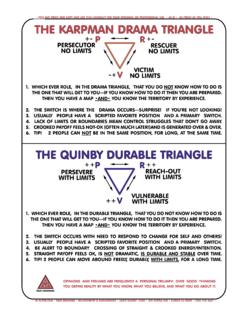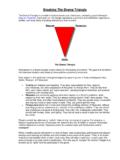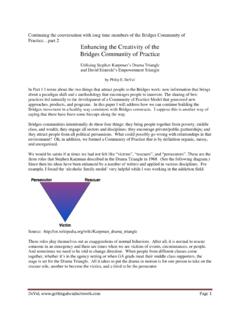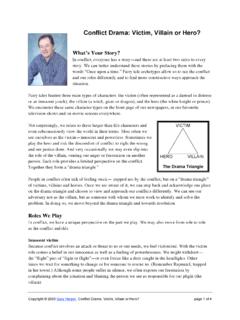Transcription of THE GAME PENTAGON - Oswald Summerton
1 Game PENTAGON 1 THE GAME PENTAGON Oswald Summerton SJ1 Abstract - The Game PENTAGON identifies organizational or cultural dimensions of games people play. Reflection on experience in a Bombay train and connections made with Berne's and karpman 's work on games , gave rise to identifying the societal dimension of game analysis, distinct from the individual dimension commonly used in TA. Organizational game analysis is not simply the application of models of individual game analysis to organizations, communities, groups and cultures. Organizational game analysis is a new kind of game analysis, and hence names of the five most common roles are summarized: Stage-manager, Spectator, Savior, Sniper and Scapegoat. Not everyone who ends in a Scapegoat role is necessarily in the Victim role of a transactional game. _____ In his description of games , Berne (1964) gave attention to sequences in games , to individual moves of the game and to psycho-social roles of the players.
2 In his contribution to script and game analysis, karpman developed the drama Triangle(1968) in which he highlighted three of the several roles Berne emphasized in game analysis and called them action roles. In this article on the Game PENTAGON , games are described as a phenomenon of groups and five roles are identified which can be filled by group Eric Berne - games and Roles Berne gave colloquial names to games according to the major transactional sequence of play, , Why Don't You Yes But, Kick Me, Blemish, etc. He also named the roles and the dynamics of games . He described the game Ain't It Awful? as a three-handed game involving an Aggressor, Victim and Confidant (1964, ) and the game of NIGYSOB as having two roles, viz., Victim and Aggressor ( , ). In Courtroom, he named the roles of Plaintiff, Defendant, 1 The author, Oswald Summerton , , is Certified Teaching Member, Instructor and Supervisor of the ITAA, a Clinical Teaching Member of TASI and WPATA, Director of TACET (Transactional Analytic Centre for Education, Research and Training) in New Delhi, India.
3 His address is: St Xavier's School, 4 Raj Niwas Marg, Delhi-110054, India. 2 Portions of this article appeared previously in of O. Summerton (1979), Transactional Game Analysis - games Since Eric Berne, New Delhi, Manohar and (1985),The Game PENTAGON , Tasi Darshan, 5(4),39-51. Game PENTAGON 2 Judge ( , ) and in Look How Hard I've Tried, the roles of Standfast, Persecutor and Authority ( , ). Attached to the the first transactional analysis of game, viz. that of Why Don't You Yes But, Berne named the roles sage parents and helpless child (1958, ); he identified the player's goal - to confound the wise ones -, and with these three descriptions, provided a palimpsest of the future drama Triangle. By 1964 Berne explicitly names Why Don't You Yes But as having the roles of Helpless Person and Advisors (1964, ). For the more complicated game of Alcoholic, Berne identified roles of "it", persecutor, rescuer, and dummy or patsy (1959, ), and by 1964 he enumerates the roles as Alcoholic, Persecutor, Rescuer, Patsy and Connection (1964, ).
4 Such roles have always been a significant part of the analysis of transactional games . Even though Berne described transactional games as goal-directed sets of ulterior transactions (1963, ) with an unexpected twist ( , ) that were played unconsciously by innocent people he also spoke of games that were consciously played through angular transactions (1964, ). He writes as though he saw group and organizational games (1963, ) as having different parameters than his basic definition of what constitutes a transactional game (1964, ). It is the configuration of role relationships of games played in organizations and social networks whether consciously or unconsciously, whether through ulterior, angular or simple transactions which are the cornerstone of the PENTAGON described in this article. karpman 's Triangle - Roles and Switches karpman 's first notes on the drama Triangle were in January 1965 at a time when he was working out switches in football by which a quarterback could outsmart a defensive halfback (1973, ).
5 The first roles in his football moves were Dummy, Persecutor, Victim. At the time of seeing the movie Valley of the Dolls in which there were all sorts of switches he made a link with what Eric was saying about fairy tales; Eric was writing on them for the Hello Book ( ). In 1968 karpman produced his article on script drama analysis (1968), and the drama Triangle was born in which the action roles and switches of the "emotional reversals that are drama " were connected with identity roles and switches in the fairy tale (1968, ). The roles of Persecutor, Rescuer and Victim became the three primary roles for understanding the psychological dynamics of a person's life roles as seen through fairy tale analysis. karpman later said, "Through popular usage it became used as a game triangle" for which he got many strokes at summer conferences (1973, ). He established a connection between the roles people live according to the social scenario of their scripts (identity roles) and their psychological positions on the triangle (action roles).
6 The Game PENTAGON continues the story line of the script mentioned by karpman ( ) developing the interconnection between the roles of an unfolding social event with its psychodynamics, and with the roles and switches in a game. Game PENTAGON 3 ERSECUTORESCUERICTIMPRVF igure 1 - drama Triangle (1973) The simplified drawing of the drama Triangle (Figure 1), shows "a clean three line triangle with arrows added in during use"."For Structural Analysis you show that once someone is in the Triangle they (and others) are all the roles at once. For Transactional Analysis, the transactional arrows are super-imposed on the Triangle, and for the Game Analysis a sweeping curved arrow representing the switch is drawn to the side of the Triangle" (1973, ). The essential elements of the drama Triangle are: (1) the series of interactions where "it" remains in one role, and (2) the switch of "it" to a second role.
7 The drama Triangle was acclaimed by Berne (1972, ) for its analysis of an individual's psychological games , as well as for describing externally observable situations (1970, ). It is the externally observable situation that is the focus of the Game PENTAGON . Berne had written earlier about games played in organizations (1963, ), and this taken together with what he wrote about con games (1964, ) suggests that he had in mind games that are played in organizations as well as of what individuals are doing inside their heads in relation to others. While the triangle is frequently used for describing an individual's game dynamics, the Game PENTAGON is suggested as a tool for social and systems analysis in family, group, organizational, and community game analysis. A Game is "a proceeding carried on according to set rules"(Delbridge,1981), or, "a form of contest played according to rules and decided by skill, strength or luck" (Fowler,1981).
8 Both of these come within the total purview of the PENTAGON . While the PENTAGON does not fill the strict definition of a TA game, in a broad sense it offers a prelude and environment for game analysis as well as a model of games played both consciously and unconsciously in the one event (Berne,1964, ). The Game PENTAGON In its original presentation (1979, ), the Game PENTAGON was named the Orgame PENTAGON because of its organizational connotation. The author had adopted a systems approach to the relationship knots that occur in organizations so that while the players began to see their Game PENTAGON 4 part in the whole event they did not feel accused of playing psychological games . Yet the PENTAGON is related to the definitions of a TA game while it also includes other meanings of the word game as used by Berne. Further, a tradition has grown up in TA practice whereby Persecutors, Rescuers and Victims, , people making a play of their personal game, are distinguished from persecutors, rescuers and victims, , people who are not involved in a personal game, those in the helping professions (Steiner,1971, ).
9 Such persecutors, rescuers and victims still need to see how they fit into the psycho-social context and so assess the appropriateness of their interventions and strategies. This has led the author to find terms that will include karpman 's three roles when extrapolated into social systems, as well as include two other roles, one arising from Berne's so-called minor roles (1972, ). The Game PENTAGON will be described below as a tool to analyze games from the external point of view rather than their internal and interpersonal dynamics. What happens on the PENTAGON will need to be distinguished in practice from what happens within the triangle. The Five Roles of the PENTAGON The five roles of the PENTAGON are Stage-manager, Spectator, Sniper, Savior and Scapegoat. The Stage-manager role can be described as that of the originator or source of a social event. It is the role of the person who has unconsciously set up a scenario through specific, externalized words, impressions, inactions, actions, or has consciously master-minded an operation.
10 The Stage-manager sets the stage for the drama by being an initiator in, for example, Let's You and Him Fight, Uproar, Why Don't You Yes But, etc. The Connection in the Alcoholic game is another example of a Stage-manager. The Stage-manager's behaviour can be identified as that of initiator, provider, liaison, sustainer, etc. The Stage-manager may be in a position of authority or powerlessness. Locating the role of Stage-manager helps to pin-point accountability in the organization or society, searching for the historical, bureaucratic, legal or cultural sources of a group conflict without apportioning blame. Wars, riots and protest marches have their various Stage-managers at different points of history and these Stage-manager are often forgotten as they may not appear on the actual scene of dramatic events. The Spectator has the role of audience in the dramatic action. The Spectator sits back and views the spectacle, providing support by being interested in the events, yet appearing not to be involved or invested in the outcome.









